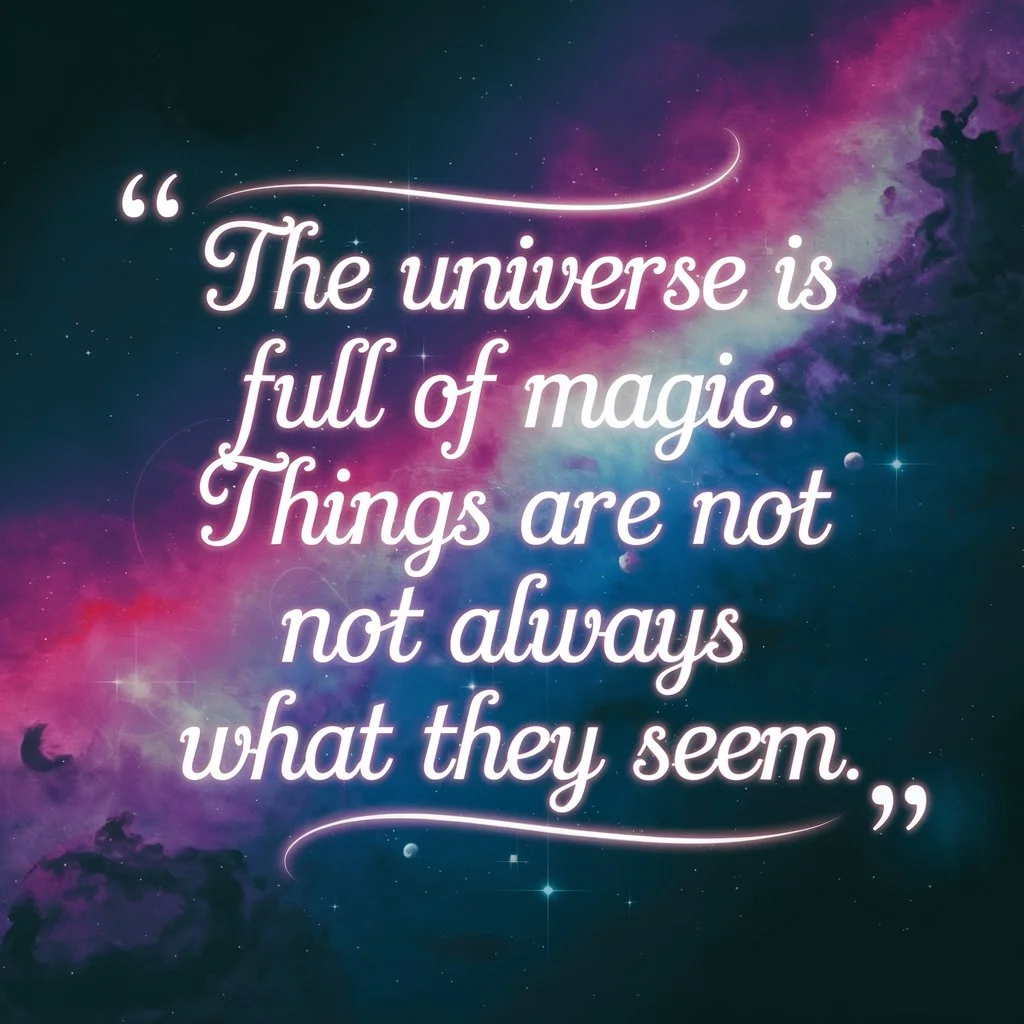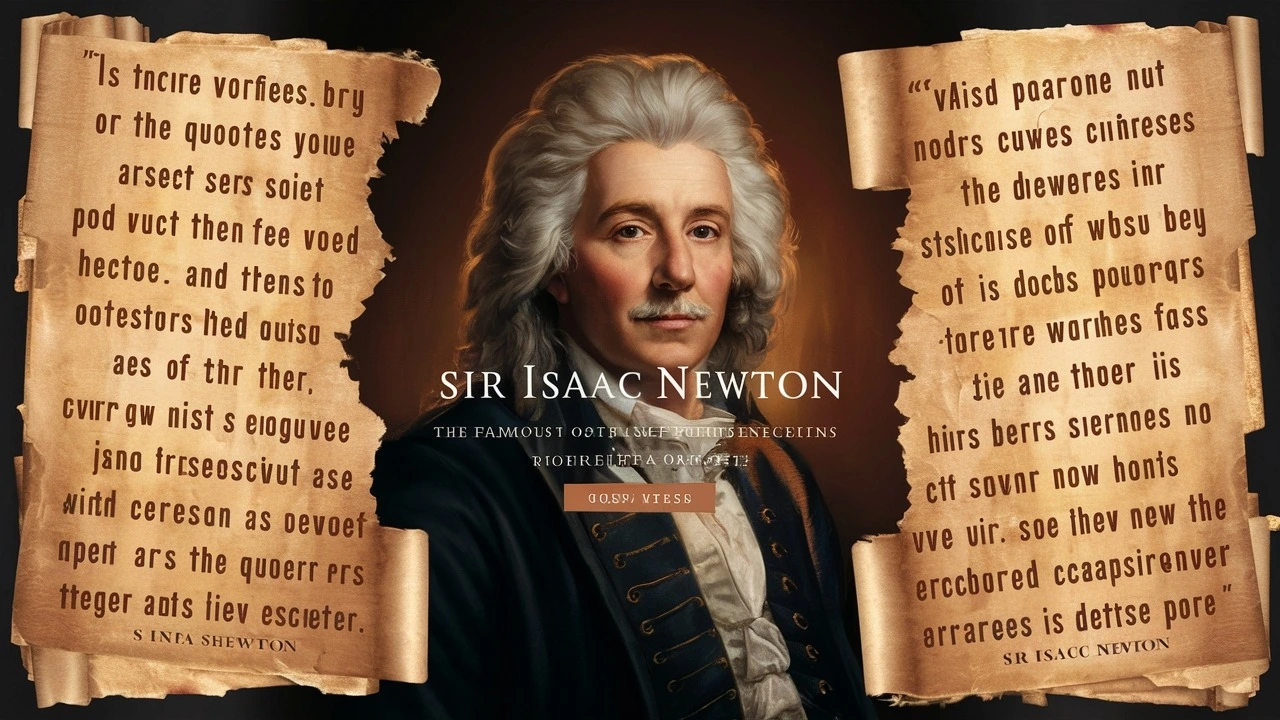Last updated on October 13th, 2024 at 08:10 am
In this post, we’ll explore some of the most thought-provoking Isaac Newton Quotes, each reflecting his profound intellect and influence on the world.
Isaac Newton was a pioneering physicist and mathematician whose work laid the foundation for modern science.
He is most famously known for his laws of motion and universal gravitation, but his insights extended beyond physics to mathematics, optics, and even theology.
On the Nature of Knowledge
“If I have seen further, it is by standing on the shoulders of Giants.”
Author: Isaac Newton
Description:
Newton humbly acknowledges that his groundbreaking discoveries were made possible by building on the work of those who came before him. This quote emphasizes the importance of collaboration and learning from others.
“What we know is a drop, what we don’t know is an ocean.”
Author: Isaac Newton
Description:
This quote reflects Newton’s understanding of the vastness of the unknown and the limits of human knowledge, reminding us of the continuous journey of discovery.
“To explain all nature is too difficult a task for any one man or even for any one age.”
Author: Isaac Newton
Description:
Newton recognized the complexity of nature and the limitations of any single individual’s ability to fully comprehend it, highlighting the need for ongoing scientific inquiry.
“Truth is ever to be found in simplicity, and not in the multiplicity and confusion of things.”
Author: Isaac Newton
Description:
Newton believed in the power of simplicity in understanding the natural world, a principle that guided his scientific endeavors.
“A man may imagine things that are false, but he can only understand things that are true.”
Author: Isaac Newton
Description:
This quote underscores Newton’s belief in the importance of truth and rational understanding, as opposed to mere imagination or speculation.
“To myself, I am only a child playing on the beach, while vast oceans of truth lie undiscovered before me.”

Author: Isaac Newton
Description:
Newton’s humility is evident in this quote, where he likens his discoveries to a child finding pebbles on the shore, with much more left to explore.
“Errors are not in the art but in the artificers.”
Author: Isaac Newton
Description:
Newton suggests that mistakes in scientific understanding are due to human error rather than flaws in the scientific method itself.
“I can calculate the motion of heavenly bodies, but not the madness of people.”
Author: Isaac Newton
Description:
This quote highlights Newton’s recognition of the predictability of the natural world in contrast to the unpredictability of human behavior.
“No great discovery was ever made without a bold guess.”
Author: Isaac Newton
Description:
Newton emphasizes the role of intuition and bold hypotheses in making significant scientific breakthroughs.
“In the absence of any other proof, the thumb alone would convince me of God’s existence.”
Author: Isaac Newton
Description:
Newton saw the complexity and functionality of the human body as evidence of a divine creator, illustrating his belief in the interplay between science and religion.
On Science and Experimentation
“Tact is the art of making a point without making an enemy.”
Author: Isaac Newton
Description:
While not directly about science, this quote reflects Newton’s understanding of the importance of diplomacy in scientific discourse and debate.
“If others would think as hard as I did, then they would get similar results.”
Author: Isaac Newton
Description:
Newton believed that his success was not due to inherent genius but to his relentless effort and determination, encouraging others to work hard to achieve similar outcomes.
“To every action, there is always opposed an equal reaction.”
Author: Isaac Newton
Description:
This is Newton’s Third Law of Motion, which describes the fundamental principle of interaction between two bodies. It has become a cornerstone of classical mechanics.
“Gravity explains the motions of the planets, but it cannot explain who sets the planets in motion.”
Author: Isaac Newton
Description:
Newton acknowledges the limitations of science in explaining the origin of the universe, leaving room for theological interpretation.
“What goes up must come down.”
Author: Isaac Newton
Description:
A simplified expression of Newton’s law of gravity, emphasizing the inevitable pull of gravity on all objects.
“I do not know what I may appear to the world, but to myself, I seem to have been only like a boy playing on the seashore, and diverting myself in now and then finding a smoother pebble or a prettier shell than ordinary, whilst the great ocean of truth lay all undiscovered before me.”
Author: Isaac Newton
Description:
This quote reflects Newton’s sense of wonder and curiosity about the natural world, acknowledging the vastness of what remains unknown.
“My powers are ordinary. Only my application brings me success.”
Author: Isaac Newton
Description:
Newton downplays his intellectual abilities, attributing his achievements to perseverance and hard work rather than innate genius.
“I keep the subject constantly before me, and wait till the first dawnings open slowly, by little and little, into a full and clear light.”
Author: Isaac Newton
Description:
Newton describes his methodical approach to problem-solving, emphasizing patience and persistence in uncovering the truth.
“Nature is pleased with simplicity. And nature is no dummy.”
Author: Isaac Newton
Description:
This quote highlights Newton’s belief in the elegance and simplicity of natural laws, which he saw as a reflection of the underlying order of the universe.
“The more I study science, the more I believe in God.”
Author: Isaac Newton
Description:
Newton’s scientific explorations deepened his belief in a divine creator, showing that for him, science and faith were not mutually exclusive.
On Mathematics and Calculus
“Mathematics is the language in which God has written the universe.”
Author: Isaac Newton
Description:
Newton viewed mathematics as the fundamental language of nature, essential for understanding the workings of the universe.
“I can no longer doubt the existence of God than I can the certainty of mathematics.”
Author: Isaac Newton
Description:
Newton equates the certainty of mathematical truths with the certainty of God’s existence, reflecting his deep faith and belief in a rational universe.
“I was never able to discover the cause of those properties of gravity from phenomena, and I frame no hypotheses.”

Author: Isaac Newton
Description:
This quote is an expression of Newton’s scientific rigor, where he admits the limits of his understanding and refrains from making speculative assumptions.
“Errors using inadequate data are much less than those using no data at all.”
Author: Isaac Newton
Description:
Newton emphasizes the importance of empirical evidence in scientific investigation, warning against concluding without sufficient data.
“The description of right lines and circles, upon which geometry is founded, belongs to mechanics.”
Author: Isaac Newton
Description:
Newton acknowledges the mechanical basis of geometric principles, illustrating his understanding of the interconnectedness of different branches of science.
“The motions of the planets are not random, but they follow a precise mathematical order.”
Author: Isaac Newton
Description:
Newton asserts that the movements of celestial bodies are governed by mathematical laws, highlighting his contributions to the field of celestial mechanics.
“Geometry, which should only be used in surveying and measuring lands, was abused by being applied to explain the heavens.”
Author: Isaac Newton
Description:
Newton critiques the overextension of geometric principles to areas beyond their intended application, reflecting his belief in the appropriate use of mathematical tools.
“The less mathematics is taught the way it ought to be taught, the more difficulty there will be for students.”
Author: Isaac Newton
Description:
Newton stresses the importance of proper mathematical instruction, advocating for a clear and effective teaching approach to help students grasp complex concepts.
“I considered the Sun and the fixed stars as at rest, and the planets revolved about the Sun in ellipses, having their common center of gravity within the Sun.”
Author: Isaac Newton
Description:
This quote summarizes Newton’s heliocentric model, where the Sun is the central body around which planets orbit, a foundational concept in astronomy.
“In experiments, there should be no variations unless the quantities of matter vary in proportion to their densities.”
Author: Isaac Newton
Description:
Newton emphasizes the importance of consistency and proportionality in scientific experiments, reflecting his commitment to precision in measurement and observation.
On Religion and God
“In the absence of any other proof, the thumb alone would convince me of God’s existence.”
Author: Isaac Newton
Description:
Newton saw the complexity and functionality of the human body as evidence of a divine creator, illustrating his belief in the interplay between science and religion.
“Gravity explains the motions of the planets, but it cannot explain who sets the planets in motion.”

Author: Isaac Newton
Description:
Newton acknowledges the limitations of science in explaining the origin of the universe, leaving room for theological interpretation.
“The more I study science, the more I believe in God.”
Author: Isaac Newton
Description:
Newton’s scientific explorations deepened his belief in a divine creator, showing that for him, science and faith were not mutually exclusive.
“God created everything by number, weight, and measure.”
Author: Isaac Newton
Description:
This quote reflects Newton’s belief that the universe is orderly and governed by mathematical laws, which he saw as evidence of divine design.
“We account the Scriptures of God to be the most sublime philosophy.”
Author: Isaac Newton
Description:
Newton regarded the Bible as a profound source of wisdom, blending his religious beliefs with his philosophical and scientific inquiries.
“He who thinks half-heartedly will not believe in God, but he who thinks has to believe in God.”
Author: Isaac Newton
Description:
Newton suggests that deep, rational contemplation leads to belief in God, reflecting his view that faith and reason are interconnected.
“Atheism is so senseless and odious to mankind that it never had many professors.”
Author: Isaac Newton
Description:
Newton expresses his disdain for atheism, arguing that it is contrary to human nature and has always been a minority view.
“God gave the prophesies, not for historians to compute, but for Christians to read.”
Author: Isaac Newton
Description:
Newton believed that biblical prophecies were intended for spiritual guidance rather than historical analysis, emphasizing their relevance to faith.
“Opposition to God, while futile, is the greatest folly.”
Author: Isaac Newton
Description:
Newton warns against resisting divine will, suggesting that such opposition is both irrational and ultimately unsuccessful.
“There are more sure marks of authenticity in the Bible than in any profane history whatsoever.”
Author: Isaac Newton
Description:
Newton viewed the Bible as a more reliable historical document than any secular source, reflecting his deep reverence for Scripture.
On the Nature of Reality
“To explain all nature is too difficult a task for any one man or even for any one age.”
Author: Isaac Newton
Description:
Newton recognized the complexity of nature and the limitations of any single individual’s ability to fully comprehend it, highlighting the need for ongoing scientific inquiry.
“Truth is ever to be found in simplicity, and not in the multiplicity and confusion of things.”
Author: Isaac Newton
Description:
Newton believed in the power of simplicity in understanding the natural world, a principle that guided his scientific endeavors.
“I keep the subject constantly before me, and wait till the first dawnings open slowly, by little and little, into a full and clear light.”
Author: Isaac Newton
Description:
Newton describes his methodical approach to problem-solving, emphasizing patience and persistence in uncovering the truth.
“Nature is pleased with simplicity. And nature is no dummy.”
Author: Isaac Newton
Description:
This quote highlights Newton’s belief in the elegance and simplicity of natural laws, which he saw as a reflection of the underlying order of the universe.
“If I have seen further, it is by standing on the shoulders of Giants.”
Author: Isaac Newton
Description:
Newton humbly acknowledges that his groundbreaking discoveries were made possible by building on the work of those who came before him. This quote emphasizes the importance of collaboration and learning from others.
“What we know is a drop, what we don’t know is an ocean.”
Author: Isaac Newton
Description:
This quote reflects Newton’s understanding of the vastness of the unknown and the limits of human knowledge, reminding us of the continuous journey of discovery.
“Errors are not in the art but in the artificers.”
Author: Isaac Newton
Description:
Newton suggests that mistakes in scientific understanding are due to human error rather than flaws in the scientific method itself.
“I can calculate the motion of heavenly bodies, but not the madness of people.”
Author: Isaac Newton
Description:
This quote highlights Newton’s recognition of the predictability of the natural world in contrast to the unpredictability of human behavior.
“In the absence of any other proof, the thumb alone would convince me of God’s existence.”
Author: Isaac Newton
Description:
Newton saw the complexity and functionality of the human body as evidence of a divine creator, illustrating his belief in the interplay between science and religion.
“To myself, I am only a child playing on the beach, while vast oceans of truth lie undiscovered before me.”
Author: Isaac Newton
Description:
Newton’s humility is evident in this quote, where he likens his discoveries to a child finding pebbles on the shore, with much more left to explore.
On Light and Optics
“The rays, to speak properly, are not colored. In them, there is nothing else than a certain power and disposition to stir up a sensation of this or that color.”
Author: Isaac Newton
Description:
Newton explains his theory of color, where light itself does not possess color but has the potential to produce the sensation of color in the human eye.
“To explain all nature is too difficult a task for any one man or even for any one age.”
Author: Isaac Newton
Description:
Newton recognized the complexity of nature and the limitations of any single individual’s ability to fully comprehend it, highlighting the need for ongoing scientific inquiry.
“Do not go out to see the rays, but see their reflections.”
Author: Isaac Newton
Description:
Newton emphasizes the importance of reflection in understanding the nature of light, a key concept in his work on optics.
“Light is a mixture of rays differently refrangible.”
Author: Isaac Newton
Description:
Newton’s experiments with prisms led him to conclude that white light is composed of different colors, each bending at different angles when passed through a prism.
“The color of an object is determined by the light that is reflected from it.”
Author: Isaac Newton
Description:
Newton explains that an object’s color is due to the specific wavelengths of light it reflects, a fundamental concept in optics.
“The perfection of optical instruments depends not so much on the construction of the instruments, as on the quality of the materials.”
Author: Isaac Newton
Description:
Newton highlights the importance of material quality in the effectiveness of optical instruments, reflecting his attention to detail in scientific experimentation.
“The doctrine of colors and refractions is not so much difficult to be understood, as to be believed.”
Author: Isaac Newton
Description:
Newton acknowledges the counterintuitive nature of his discoveries in optics, which challenged existing beliefs about light and color.
“The science of optics aims to understand the nature of light, and to ascertain the laws according to which its various phenomena are governed.”
Author: Isaac Newton
Description:
Newton’s work in optics sought to uncover the fundamental principles governing light, contributing to our understanding of vision and perception.
“In the experiment of the prism, the light that is reflected from a mirror is not altered by the prism, but only bent.”
Author: Isaac Newton
Description:
Newton clarifies that a prism does not change the nature of light but only alters its direction, leading to the dispersion of colors.
“The rainbow is caused by the refraction and reflection of light within raindrops.”
Author: Isaac Newton
Description:
Newton’s explanation of the rainbow illustrates his understanding of how light interacts with water droplets to produce a spectrum of colors.
On the Laws of Motion
“To every action, there is always opposed an equal reaction.”
Author: Isaac Newton
Description:
This is Newton’s Third Law of Motion, which describes the fundamental principle of interaction between two bodies. It has become a cornerstone of classical mechanics.
“A body at rest will remain at rest, and a body in motion will remain in motion unless acted upon by an external force.”
Author: Isaac Newton
Description:
Newton’s First Law of Motion, also known as the law of inertia, explains that objects maintain their state of motion unless influenced by an external force.
“The acceleration of an object is directly proportional to the net force acting on it and inversely proportional to its mass.”
Author: Isaac Newton
Description:
Newton’s Second Law of Motion establishes the relationship between force, mass, and acceleration, forming the basis of classical mechanics.
“The motions of the planets are not random, but they follow a precise mathematical order.”
Author: Isaac Newton
Description:
Newton asserts that the movements of celestial bodies are governed by mathematical laws, highlighting his contributions to the field of celestial mechanics.
“The force of attraction is inversely proportional to the square of the distance between two objects.”
Author: Isaac Newton
Description:
This is a summary of Newton’s law of universal gravitation, which describes how the force of gravity between two objects diminishes with the square of the distance between them.
“An object in motion stays in motion with the same speed and in the same direction unless acted upon by an unbalanced force.”
Author: Isaac Newton
Description:
This restates Newton’s First Law of Motion, emphasizing the concept of inertia and the necessity of an external force to change an object’s state of motion.
“The greater the mass of the object being accelerated, the greater the amount of force needed to accelerate that object.”
Author: Isaac Newton
Description:
This quote highlights the practical application of Newton’s Second Law of Motion, explaining why larger objects require more force to change their motion.
“Every particle of matter in the universe attracts every other particle with a force that is directly proportional to the product of their masses and inversely proportional to the square of the distance between their centers.”
Author: Isaac Newton
Description:
This is a more detailed expression of Newton’s law of universal gravitation, which applies to all objects in the universe, from planets to particles.
“The law of universal gravitation is the foundation upon which the whole structure of modern astronomy rests.”
Author: Isaac Newton
Description:
Newton’s law of universal gravitation is fundamental to our understanding of the cosmos, providing the basis for modern astronomical theories.
“The three laws of motion form the foundation of classical mechanics and are essential to the study of physics.”
Author: Isaac Newton
Description:
Newton’s three laws of motion are the bedrock of classical mechanics, underpinning much of what we know about the behavior of physical systems.
On-Time and Space
“Absolute, true, and mathematical time, of itself, and from its nature, flows equably without relation to anything external.”
Author: Isaac Newton
Description:
Newton introduced the concept of absolute time, which he believed to be a constant and universal flow, independent of external factors.
“The motions of the planets are not random, but they follow a precise mathematical order.”
Author: Isaac Newton
Description:
Newton asserts that the movements of celestial bodies are governed by mathematical laws, highlighting his contributions to the field of celestial mechanics.
“Space is a being, like the immensity of God, that knows no bounds.”
Author: Isaac Newton
Description:
Newton describes space as infinite and boundless, drawing a parallel between the concept of space and the divine nature of God.
“Time and space are absolute and unchanging, providing the framework within which the universe operates.”
Author: Isaac Newton
Description:
Newton’s view of time and space as absolute entities laid the groundwork for classical mechanics, influencing how we understand the physical universe.
“In the absence of any other proof, the thumb alone would convince me of God’s existence.”
Author: Isaac Newton
Description:
Newton saw the complexity and functionality of the human body as evidence of a divine creator, illustrating his belief in the interplay between science and religion.
“The duration of an object is measured by the motion of bodies, such as the sun and the stars.”
Author: Isaac Newton
Description:
Newton explains how the passage of time is measured by the movements of celestial bodies, reflecting the interconnectedness of time and space.
“Time is not affected by the existence of motion or the absence thereof.”
Author: Isaac Newton
Description:
Newton believed that time flows independently of motion, a concept that contrasts with later theories like Einstein’s relativity.
“The nature of time is such that it is experienced uniformly by all observers, regardless of their motion or position.”
Author: Isaac Newton
Description:
Newton’s concept of absolute time suggests that it is experienced the same way by all observers, a view that was later challenged by modern physics.
“Space is a vast, boundless entity that contains all matter, yet it is distinct from the objects within it.”
Author: Isaac Newton
Description:
Newton viewed space as a separate entity that holds all physical objects, but which is not defined by those objects, reflecting his belief in the independence of space.
“The absolute nature of time and space is central to our understanding of the physical universe.”
Author: Isaac Newton
Description:
Newton’s belief in the absoluteness of time and space shaped the development of classical mechanics and influenced scientific thought for centuries.
On the Mind and Thought
“If I have ever made any valuable discoveries, it has been due more to patient attention than to any other talent.”
Author: Isaac Newton
Description:
Newton attributes his success to patience and focus rather than innate talent, encouraging a disciplined approach to intellectual pursuits.
“I can calculate the motion of heavenly bodies, but not the madness of people.”
Author: Isaac Newton
Description:
This quote highlights Newton’s recognition of the predictability of the natural world in contrast to the unpredictability of human behavior.
“My powers are ordinary. Only my application brings me success.”
Author: Isaac Newton
Description:
Newton downplays his intellectual abilities, attributing his achievements to perseverance and hard work rather than innate genius.
“To myself, I am only a child playing on the beach, while vast oceans of truth lie undiscovered before me.”
Author: Isaac Newton
Description:
Newton’s humility is evident in this quote, where he likens his discoveries to a child finding pebbles on the shore, with much more left to explore.
“Errors are not in the art but in the artificers.”
Author: Isaac Newton
Description:
Newton suggests that mistakes in scientific understanding are due to human error rather than flaws in the scientific method itself.
“No great discovery was ever made without a bold guess.”
Author: Isaac Newton
Description:
Newton emphasizes the role of intuition and bold hypotheses in making significant scientific breakthroughs.
“The more I study science, the more I believe in God.”
Author: Isaac Newton
Description:
Newton’s scientific explorations deepened his belief in a divine creator, showing that for him, science and faith were not mutually exclusive.
“I do not know what I may appear to the world, but to myself, I seem to have been only like a boy playing on the seashore, and diverting myself in now and then finding a smoother pebble or a prettier shell than ordinary, whilst the great ocean of truth lay all undiscovered before me.”
Author: Isaac Newton
Description:
This quote reflects Newton’s sense of wonder and curiosity about the natural world, acknowledging the vastness of what remains unknown.
“To myself, I am nothing, but in nature, I am everything.”
Author: Isaac Newton
Description:
Newton expresses his humility and his belief in the greater importance of the natural world over individual achievements.
“A man may imagine things that are false, but he can only understand things that are true.”
Author: Isaac Newton
Description:
This quote underscores Newton’s belief in the importance of truth and rational understanding, as opposed to mere imagination or speculation.
On Challenges and Overcoming Adversity
“I keep the subject constantly before me, and wait till the first dawnings open slowly, by little and little, into a full and clear light.”
Author: Isaac Newton
Description:
Newton describes his methodical approach to problem-solving, emphasizing patience and persistence in uncovering the truth.
“If I have ever made any valuable discoveries, it has been due more to patient attention than to any other talent.”
Author: Isaac Newton
Description:
Newton attributes his success to patience and focus rather than innate talent, encouraging a disciplined approach to intellectual pursuits.
“My powers are ordinary. Only my application brings me success.”
Author: Isaac Newton
Description:
Newton downplays his intellectual abilities, attributing his achievements to perseverance and hard work rather than innate genius.
“I keep the subject constantly before me, and wait till the first dawnings open slowly, by little and little, into a full and clear light.”
Author: Isaac Newton
Description:
Newton describes his methodical approach to problem-solving, emphasizing patience and persistence in uncovering the truth.
“Errors are not in the art but in the artificers.”
Author: Isaac Newton
Description:
Newton suggests that mistakes in scientific understanding are due to human error rather than flaws in the scientific method itself.
“If others would think as hard as I did, then they would get similar results.”
Author: Isaac Newton
Description:
Newton believed that his success was not due to inherent genius but to his relentless effort and determination, encouraging others to work hard to achieve similar outcomes.
“No great discovery was ever made without a bold guess.”
Author: Isaac Newton
Description:
Newton emphasizes the role of intuition and bold hypotheses in making significant scientific breakthroughs.
“To myself, I am nothing, but in nature, I am everything.”
Author: Isaac Newton
Description:
Newton expresses his humility and his belief in the greater importance of the natural world over individual achievements.
“I was never able to discover the cause of those properties of gravity from phenomena, and I frame no hypotheses.”
Author: Isaac Newton
Description:
This quote is an expression of Newton’s scientific rigor, where he admits the limits of his understanding and refrains from making speculative assumptions.
“I do not know what I may appear to the world, but to myself, I seem to have been only like a boy playing on the seashore, and diverting myself in now and then finding a smoother pebble or a prettier shell than ordinary, whilst the great ocean of truth lay all undiscovered before me.”
Author: Isaac Newton
Description:
This quote reflects Newton’s sense of wonder and curiosity about the natural world, acknowledging the vastness of what remains unknown.










